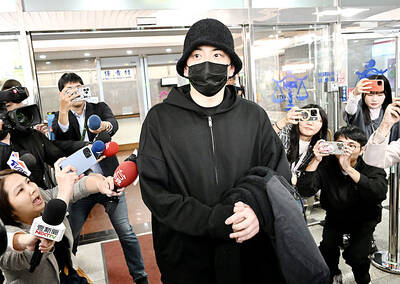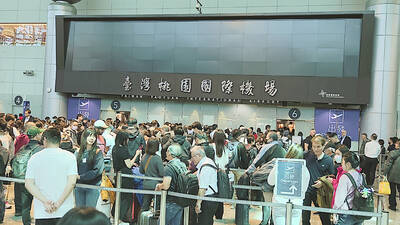Taipei Mayor Hau Lung-bin (郝龍斌) expressed confidence yesterday that the mass rapid transit (MRT) system’s Neihu Line will be operational by June next year.
The Ministry of Transportation inspection is scheduled for Feb. 18. When work began on the line in May 2002, the completion date was this year, but a number of construction difficulties forced postponements.
While inspecting a test run of the Dahu Park station segment of the line yesterday morning, Hau told reporters that he was proud to announce that the Muzha extension line from Zhongshan Junior High School to Nangang Exhibition Hall will be operational as scheduled on June 30 next year.
Once open, the travel time from Neihu to Taipei Main Station will be 28 minutes, while a trip from Taipei Main Station to Songshan Airport station will take 14 minutes.
The Neihu Line, which has 12 above-ground stations, connects the Zhongshan Junior High School station on the Muzha Line and the blue line that runs east and west across the city.
From west to east, the 12 stations are Songshan Airport, Dazhi, Jiannan Road, Xihu, Gangqian, Wende, Neihu, Dahu Park, Huzhou, Donghu, Nangang Software Park and Nangang Exhibition Hall.
The segments between Songshan Airport and Jiannan and between Neihu and Huzhou have already passed tests, and yesterday’s test from Jiannan to Huchou went well.
Thanks to the expansion of the network, Hau said he expected to see the total transport volume of the system reach 500 million.
As the trains will operate without drivers, the route will be controlled by a command center. Department of Rapid Transit Systems (DORTS) Director Tom Chang (常歧德) said that the Neihu-Muzha Line will have a total of 152 trains traveling at more frequent intervals than the Blue Line.
As the systems used for the Muzha line and Neihu Line are different, Tsai Tien-ho (蔡天和), director of the Systemwide Electrical and Mechanical Project Office at DORTS, said that it took a tremendous amount of work to integrate them.
To reduce the inconvenience to residents living in the vicinity of the line, Tsai said most of the test work was conducted at night.

The National Immigration Agency (NIA) said yesterday that it will revoke the dependent-based residence permit of a Chinese social media influencer who reportedly “openly advocated for [China’s] unification through military force” with Taiwan. The Chinese national, identified by her surname Liu (劉), will have her residence permit revoked in accordance with Article 14 of the “Measures for the permission of family- based residence, long-term residence and settlement of people from the Mainland Area in the Taiwan Area,” the NIA said in a news release. The agency explained it received reports that Liu made “unifying Taiwan through military force” statements on her online

A magnitude 5.7 earthquake struck off Taitung County at 1:09pm today, the Central Weather Administration (CWA) said. The hypocenter was 53km northeast of Taitung County Hall at a depth of 12.5km, CWA data showed. The intensity of the quake, which gauges the actual effect of a seismic event, measured 4 in Taitung County and Hualien County on Taiwan's seven-tier intensity scale, the data showed. The quake had an intensity of 3 in Nantou County, Chiayi County, Yunlin County, Kaohsiung and Tainan, the data showed. There were no immediate reports of damage following the quake.

Actor Darren Wang (王大陸) is to begin his one-year alternative military service tomorrow amid ongoing legal issues, the Ministry of the Interior said yesterday. Wang, who last month was released on bail of NT$150,000 (US$4,561) as he faces charges of allegedly attempting to evade military service and forging documents, has been ordered to report to Taipei Railway Station at 9am tomorrow, the Alternative Military Service Training and Management Center said. The 33-year-old would join about 1,300 other conscripts in the 263rd cohort of general alternative service for training at the Chenggong Ling camp in Taichung, a center official told reporters. Wang would first

MINOR DISRUPTION: The outage affected check-in and security screening, while passport control was done manually and runway operations continued unaffected The main departure hall and other parts of Terminal 2 at Taiwan Taoyuan International Airport lost power on Tuesday, causing confusion among passengers before electricity was fully restored more than an hour later. The outage, the cause of which is still being investigated, began at about midday and affected parts of Terminal 2, including the check-in gates, the security screening area and some duty-free shops. Parts of the terminal immediately activated backup power sources, while others remained dark until power was restored in some of the affected areas starting at 12:23pm. Power was fully restored at 1:13pm. Taoyuan International Airport Corp said in a